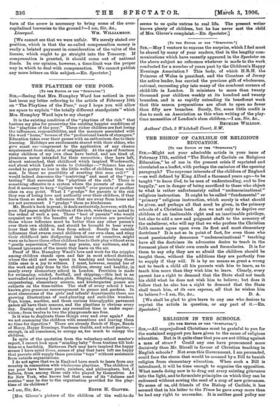THE PLAYTIME OF THE POOR.
(To THE EDITOR OF THE "SPECTATOR."] SIR,—Seeing that Mrs. Humphry Ward has noticed in your last issue my letter referring to the article of February 10th on "The Playtime of the Poor," may I hope you will allow me space to explain "the totally different standpoints" which Mrs. Humphry Ward lays to my charge ?
It is the existing condition of the "playtime of the rich" that hastens my plea for preserving the existing happier conditions of the "playtime of the poor." These richer children are fast losing the influences, responsibilities, and the manners associated with the word "home," because of the "professional hands of strangers." Education takes over their games with an enthusiasm due to their learning. Holidays are excitements shared with their elders, who give scant enueiragement to the application of any chance acquirement from study, or of originality. At the age of fourteen many children of my own class have tasted, and are tired of, pleasures never intended for their recreation ; they have left, almost untouched, that childhood which inspired Wordsworth, and about which Lamb wrote to Coleridge :—" Science has suc- ceeded to poetry no less in the little walks of children than with men. Is there no possibility of averting this sore evil 2" I would indeed denounce the " contriving " and most of the " pro- tecting " that surround the "playtime of the rich." There is something offensive in a system where the parents of one class feel it necessary to keep "vigilant watch" over parents of another class on any point. What I "grudge" for parents is the risk they run of losing love and authority over their children, if they leave them so much to influences that are away from home and are not permanent. I " grudge " them no kindnesses.
Mr. Booth's book is great; it deals exclusively, however, with the poor. Sad pages might be written of the rich, were they as naked to the ordeal of such a pen. Those "best of parents" who would acquaint me with the benefits of the play centres are precisely those whose influence must be better than any other person's over their own children, and should be brought to bear every hour that the child is free from school. Surely the outside influences that swarm round children of our own class, and sting their childhood into disfiguring imitations of ourselves, might warn us to leave these other children free to their play without even "gentle supervision," without any praise, any audience, and in blessed ignorance of the music they leave on the air.
Proof of Mrs. Humphry Ward's love and work for the cripples among children stands open and fair in most school districts, where the skill and care spent in teaching and training these little ones is a joy to witness. I must, however, remind her of the work and play done by the children, strong and healthy, in nearly every elementary school in London. Provision is made for swimming, cricket, football, and skipping,—this last is an unrivalled art among London girls. Singing, modelling, designing, carpentering, elementary science, and kindergarten games are subjects on the time-tables The staff of every school I have known give generous encouragement to games and gardens. In most classrooms of the girls' and infants' departments there are growing illustrations of seed-planting and such-like wonders. Tops, hoops, marbles, and those curious hieroglyphic pavement games all have their seasons, and the playtime is obvious every day. During school hours any recreation time is under super- vision ; from twelve to two the playgrounds are free.
Is it wise to duplicate these things over and over again ? Are we not cramming the children with sensations and leaving them no time for digestion ? There are already Bands of Hope, Bands of Mercy, Happy Evenings, Sunbeam Guilds, and school parties,— enough, in all conscience, to occupy us, too much to occupy the children.
In spite of the quotation from the voluntary-school master's report, I cannot look upon "minding baby" from teatime till bed- time as a hardship. Battersea Park may have inspired the happy scenes I have spied there, scenes of play that have left me happy that parents still supply these precious " toys " without assistance from outside organisations.
I do not agree that we in England have much to learn from any country in connection with wholesome playtime. The children of our poor have become poets, painters, and philosophers, but, I believe, from among those only who played by themselves. As for New York, who knows but that some of its "dulness and routine" may be due to the organisation provided for the play- time of its children ?
[Mrs. Glover's picture of the children of the well-to-do
seems to us quite untrue to real life. The present writer knows plenty of children, but he has never met the child of Mrs. Glover's complaint. —ED. Spectator.]














































 Previous page
Previous page